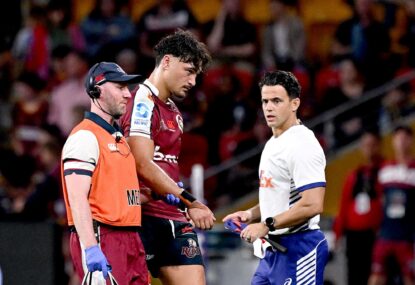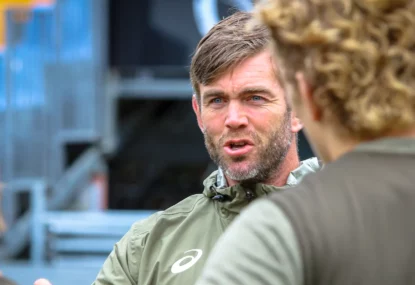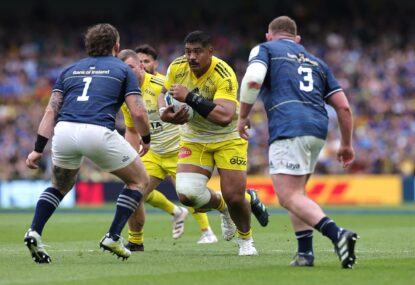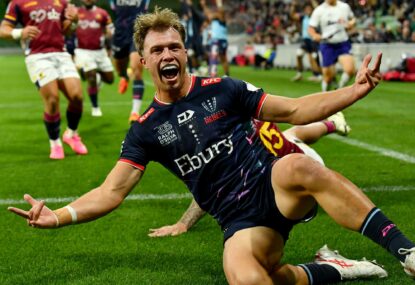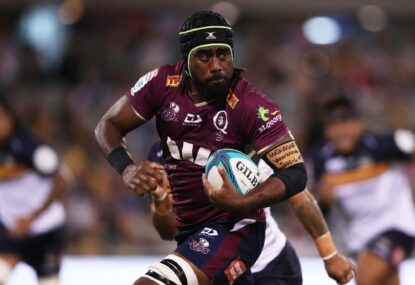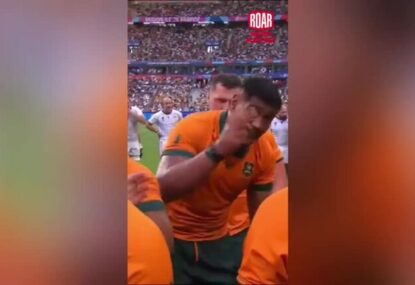Like most Australian rugby fans I am keen to see how our Wallabies fare on their upcoming European sojourn when they face the might of Wales; the grit of England; the flair of France and the improving Italians.
It is the English and Welsh tests I will look on with more interest as these tests may give the Wallabies an insight into what the British and Irish Lions may look like come 2013.
In 2013, the Lions will be taking on a combined New South Wales and Queensland Country side at Newcastle.
The Australian Rugby Union should be congratulated on not only maintaining an international rugby presence in Newcastle, but also giving the boys from the bush and chance to pit their wares against the Lions.
I expect a Lions victory but it got me thinking back to the glory days of country rugby and the players country has nurtured into Wallaby gold.
During the 1951 New Zealand tour of Australia, the All Blacks that included hard men such as Kevin Skinner and Tiny White took on a Newcastle XV which was captained by Cyril Burke of the Waratah club.
Although the All Blacks were victorious 20-6 it was an individual run by Burke that set up Newcastle’s try late in the game. Burke was one of Australia’s better half backs who played 26 tests for the Wallabies between 1946-1956.
When the New Zealanders returned in 1957 their squad included future legends Colin Meads and Wilson Whineray. However again it was a Newcastle XV that took the fight to the All Blacks.
Eventually outclassed 20-9, the Novocastrians were reported to have provided a strong challenge for the tourists. The full back for the locals on this occasion was Terrence George Curley of the Wanderers club who went onto to play 11 tests for the Wallabies.
In 1958 a Central West XV accepted the challenge from a touring New Zealand Maori side. Central had a young prop by the name of Jon White of the Yeoval club playing loose head that day who bested the tourists by 18-15.
White went onto to play 24 tests for Australia between 1958-1965 and featured in a successful tour of South Africa in 1963. White forged a reputation that stands today as being one of Australia’s greatest prop forwards.
The British and Irish Lions toured in 1959 and played a NSW Country side at Tamworth that featured a full back and centre from Wagga by the names of Jim Lenehan and Beres Ellwood.
Country was skippered by a flanker from Walcha by the name of Peter Fenwicke who was joined by Molong’s own Bill Gunther on the other flank. Although the tourists won the match 27-14 Fenwicke featured with try of his own. Those mentioned all represented our country with distinction; Gunther one test, Fenwicke six tests; Ellwood 20 tests and Lenehan 24 tests.
In 1960 the All Blacks ventured over the Tasman. NSW Country took on the New Zealander’s at Orange and were beaten up 38-6 however a young forward and dairy farmer from the Illawarra by the name of Jim Miller announced his arrival on the representative scene.
Miller went onto play six tests for Australia between 1962-1966 as a prop. Miller was a versatile forward who could play in the back and second row; a classic utility.
In 1961 the flying Fijians graced our shores and took on a Newcastle XV. A young Phil Hawthorne of the Wanders club played for Newcastle that day. Although the locals went down 17-8 Phil Hawthorne went onto to become a distinguished fly half for the Wallabies. Hawthorne played 21 tests between 1962-1967 before switching to league.
1962 and the New Zealanders were back taking on a Newcastle XV. Staring in the lock position was a 21 year old by the name of Ross Turnbull. The All Blacks won the match 29-6 but Turnbull, who earned the nick name ‘Mad-Dog,’ impressed with his willingness to confront the tourists.
In 1966 Turnbull played for NSW Country against the British Lions whose pack included Willie John McBride, Delme Thomas and Jim Telfer. It is reported the Country pack ripped into the tourists and were unlucky to lose the match 6-3 in which Turnbull featured.
In 1967 Turnbull toured with Country to New Zealand and was voted by TP McClean as one of the top five players to play in New Zealand that year. In 1968 Turnbull played his only test against Ireland as a prop forward.
That 1966 NSW Country team also featured a young half back from the Waratah club in Newcastle by the name of John Hipwell; a number eight by the name of Geoff Chapman of the Far West and a Flanker from Robb College Armidale by the name of Hugh Rose.
Hipwell went onto become a Wallaby legend, playing 36 tests between 1968 and 1982. Rose and Chapman also represented with 13 and three caps respectively.
The Irish toured in 1967 whose touring party included legends such as Willie John McBride, Tom Keirnan and Mike Gibson.
NSW Country were bested by the Irish in Wollongong 31-11, however the Macksville born lock Owen Butler displayed he had the ability to attain higher honours and went onto win seven caps between 1969-1971. Butler was a gifted forward who featured during a weakening period of Australian rugby.
New Zealand were back in 1968 and the Country boys took them on at Newcastle. The All Blacks dominated and won the match 29-3. A young centre from the Illawarra by the name of Geoff Shaw did not disgrace himself and went onto have a splendid Wallaby career that saw him capped 27 times between 1969-1979 including nine as the skipper.
Shaw was recently inducted into the Wallaby Hall of Fame.
In 1969 the Fijians bested NSW Country 22-9 at Tamworth. A young lock from Lismore by the name of Reg Smith featured that day and went onto to play 21 tests between 1971-76. Smith was a big imposing man on the park but a gentleman off it.
By 1971 the Springboks made their way to Orange to take on Country that featured a tough English born hooker by the name of Peter Horton. The Boks outclassed the locals 19-3 however Horton would not be lost to representative rugby.
Horton of the famed Waratah club in Newcastle went on to play 19 tests for Australia between 1974-79 and ended his career with successive defeats of the All Blacks in 78 and 79. A genuine hard man was Peter Horton.
The following year the French arrived and featured great players such as Jo Maso and Jean Trillo, Jean Claude Skrella and Walter Spanghero. The Country boys featuring a young fly half from Wollongong called Peter Rowles took the fight to the tourists but eventually were defeated 25-15 at the Armidale Sports Ground.
Rowles went onto win two caps for Australia. Other notables in that County pack were hard man Dick Cocks; 10 tests, John Lambie; four tests and Stu Macdougall; 8 tests.
Ian Kirkpatrick’s All Blacks toured in 1974 and dusted up Country in Dubbo. The final score 27-4. A young back from Baraba by the name of Bill McKid got his first look at the side he would later face at Eden Park in 1978 and contribute to a now famous All Black defeat. McKid played six tests for Australia and played them well.
During that same tour the tourist travelled to Toowoomba to take on the evolving Queensland Country team that featured a prop from Rockhampton by the name of Stan Pilecki. The Queenslanders went down 29-0 but Pilecki went onto become one of Queensland’s better props and won 18 caps for Australia.
In 1975 Moree was the venue when NSW Country slaughtered the touring Japanese 97-20. Bowral boy Jim Hindmarsh had a field day with the boot and later went onto win nine caps for Australia.
The standout player for Australia was none other than Greg Cornelsen who scored five tries. Cornelsen later went onto fame by scoring four against the All Blacks in 1978, his only for Australia in a wonderful career that included 25 tests for his country.
During the famous Welsh tour of Australia in 1978 one of the highlights of the tour for the visitors was their 33-0 demolition of NSW Country at Cobar. The Welsh fielded legends such as JPR Willaims, Gerald Davies, Ray Gravell and Graham Price.
The Country boys were simply outclassed but a talented winger from Bowral by the name of Steve Streeter did enough to impress Wallaby selectors and won his maiden cap against the All Blacks in Wellington later that year.
Queensland rugby was rising as a powerhouse by 1979 and a young Townsville winger by the name of Peter Grigg demanded selection. Grigg was part of an 18-18 draw with the New Zealand Maori.
Grigg went onto become a fine Australian winger that featured in the famous 1986 Bledisloe Series win in New Zealand. When he hung up the boots Grigg had played 25 tests for the Wallabies. During that same Maori tour Ollie Hall of Central West featured for NSW Country. Hall later won a cap for Australia against Fiji.
When the All Blacks toured in 1980 Newcastle was again the venue for the Country clash. The All Blacks schooled the Country boys 34-3 but Ross Reynolds and Dominic Vaughan featured and both went on to win 10 and five caps respectively several years later. Reynolds in particular was a tough back row forward who scored a wonderful try against the All Blacks at the SCG.
Spaghetti rugby arrived in Australia in 1981. The Italians took on NSW Country at Dapto and secured a victory 18-13.
Locking the scrum for the Country boys was Quirindi’s own David Carter who was a fearless forward that went onto debut for the Wallabies in 1988 and tour France in 1989 winning five caps in his career. Carter is known for his non nonsense forward play that personifies Country rugby.
In 1983 Country took and the All Blacks at Tamworth but lost, in that same match Cowboy Shaw took on David Carter and also lost.
Hugo Porta and Topo Rodriguez came to Australia in 1983 and gave Australians a lesson in rugby. During that tour the Pumas fronted NSW Country at Narrabri and walloped them 46-3, however Orange City flanker David Codey featured and later won 13 caps for Australia, one as skipper. Also featuring in this match was prop John Coolican who later won four caps for Australia.
In 1984 Fiji took on NSW Country in Canberra and were thumped by the hosts 43-0. Featuring for the locals was Canberra North’s centre Brad Girvan who won a single cap for the Wallabies against England at Twickenham in 1988.
Geoff Didier also featured and retired an uncapped Wallaby. The Fijians returned in 1985 where four-test Wallaby James Grant of the Illawarra featured in the Country game at Singleton.
Sam Scott-Young launched his representative career in 1986 when he played for Queensland Country against the touring Italians. Scott-Young was a true competitor, is a legend of Queensland rugby earned seven caps for Australia.
When Tonga toured in 1993 Steve Merrick of Singleton featured in the NSW Country match at Cootamundra and later won two caps for Australia.
During the same tour Ryan Constable of Noosa and Matt Cockbain of Cairns represented Queensland Country in Townville. Constable later won a single cap but Cockbain went onto to be a noted Wallaby winning 63 caps and a rugby World Cup in 1999.
Later that year the Springboks toured and played NSW Country at Mudgee that featured local boy John Langford who went onto win four caps.
Scotland toured in 1998 and met NSW Country at Bathurst. Scott Fava of Kiama was on a flank for the country boys and later won himself five test caps.
From the ‘Country Boys’ I’ve put together this team. Considering the talent the bush has given Australian rugby perhaps it’s time we looked at the bush for our ‘missing’ talent as they have clearly served Australian rugby in the past.
1. Jon White (Yeoval) (VC)
2. Peter Horton (Waratah Newcastle)
3. Stan Pilecki (Rockhampton)
4. Matt Cockbain (Cairns)
5. Jim Miller (Kiama)
6. David Carter (Qurindi)
7. David Codey (Orange City)
8. Greg Cornelsen (University of New England)
9. John Hipwell (Waratah Newcastle)
10. Phil Hawthorne (Wanderers Newcastle)
11. Bill McKid (Barabra)
12. Geoff Shaw (Illawarra) (C)
13. Beres Ellwood (Wagga-Wagga)
14. Peter Grigg (Townsville)
15. Jim Lenehan (Wagga-Wagga)
16. Peter Palmer (Port Kembla)
17. Ross Turnbull (Wanderers Newcastle)
18. Ross Reynolds (Mitchell College)
19. Sam Scott-Young (Townsville)
20. Cyril Burke (Waratah Newcastle)
21. Jim Hindmarsh (Bowral)
22. Terry Curley (Wanderers Newcastle)
Coach: Darryl Haberecht, Patron: Harry Ivamey.





























































































